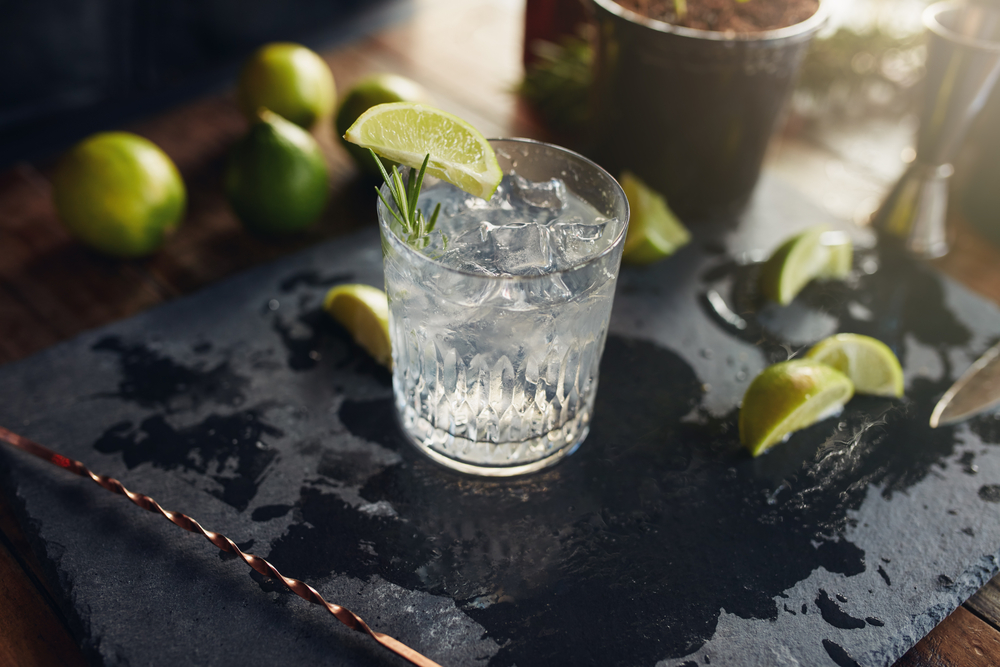A Gin & Tonic To Slow Aging?

Most people who can tolerate alcohol have a favorite drink. Some people prefer higher proof alcohol drinks with a distinct alcoholic bite, but others prefer something more subtle with an overall smooth taste without any bite at all. Humans have managed to distil drinks to meet the various requirements of our taste over time. Mixed drinks have long been a popular way to achieve something that’s “just right”. Some of them, like the gin and tonic, become so popular that they’re available the world over with every competent bartender knowing how to prepare one. Interestingly enough, the gin and tonic enjoy a number of reputations including a reputation for somehow being able to help reduce the signs of aging. This runs in contrast to common knowledge of the effects of alcohol on our skin and as a result, it should be looked at carefully and with a skeptical mindset.
Alcohol and Skin
Before we go any farther, we need to stress that alcohol typically does your skin no favors. It can end up damaging the collagen, a primary structural protein, in your skin as well as leading to discolorations under the skin due to disrupting capillaries. None of this helps you look any better. That’s not even the biggest of your worries either. Too much alcohol can end up drying your skin out as well and end up causing it to be more susceptible to all forms of damage. Most of these effects come from drinking more than is healthy. That means an average of one or two glasses at most for the average adult. It is typically best to stick with one glass as this limit is a little temperamental and governed by body weight. As a result of all these problems, alcohol typically isn’t something anyone associates with healthy skin, but some manufacturers have claimed to have found a way to make gin a skincare treat.
A Different Kind of Gin
It is important to note here that a gin and tonic with any old gin isn’t going to do your skin any good. Almost all of these claims surround so-called “collagen gins” that incorporate collagen, botanical extracts and other nebulous ingredients with the purpose of infusing the drink with anti-aging properties. These drinks are relatively new to the shelves of gin lovers everywhere. They take advantage of the current craze at using or infusing collagen in anything that they can and claiming it must necessarily have anti-aging properties. There are a lot of problems associated with these claims that tend to be unaddressed by these specialty gins. Before deciding if there is any way that a gin and tonic could possibly help your skin, we need to take a closer look at what is often missing when it comes to these claims. It is very easy to make a marketing claim, but far harder to back it up with evidence.
Zero Proof
One of the glaring absences with these gin brands is that none of them provide any reliable proof of their claims. They ride entirely upon the idea that putting collagen in the drink is enough to improve the skin. It isn’t. That collagen, regardless of its source, will likely be broken down by the alcohol and changed to a degree. Additionally, drinking the gin will necessarily only give you a fractional amount of whatever remains of the collagen next to the lion’s share of alcohol that comes along with it. This would seem like it might be enough to help give a few components though. The problem here is that most of the brands don’t specify which collagen they’re putting in their drinks. Your body can use your own collagen and potentially break down sheep collagen into usable components in some cases, but your body doesn’t stop at “collagen”. It breaks it all the way down. This is important when it comes to eating or drinking something with collagen in it because not only do you generally not know if it is compatible, but you also don’t know if any of those components will get anywhere near your skin. All of this makes a gin and tonic for your skin’s health an incredibly dubious claim.
Collagen foods and drinks may be a popular trend, but there’s nothing to really suggest them over a standard healthy diet. There’s no way to know if the collagen is one your body can use or if the components will even reach your skin. Collagen is everywhere in your body and almost everywhere else has priority over your skin. With this in mind, feel free to enjoy and gin and tonic, but don’t expect it to have anti-aging properties.

